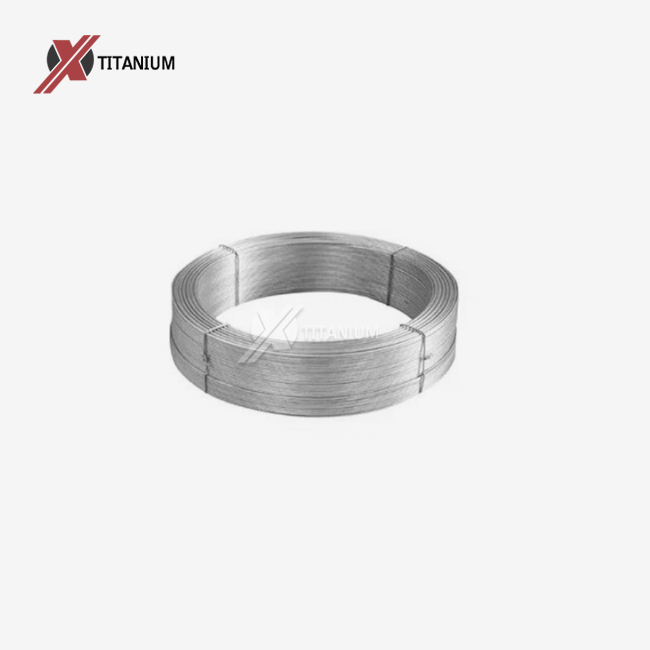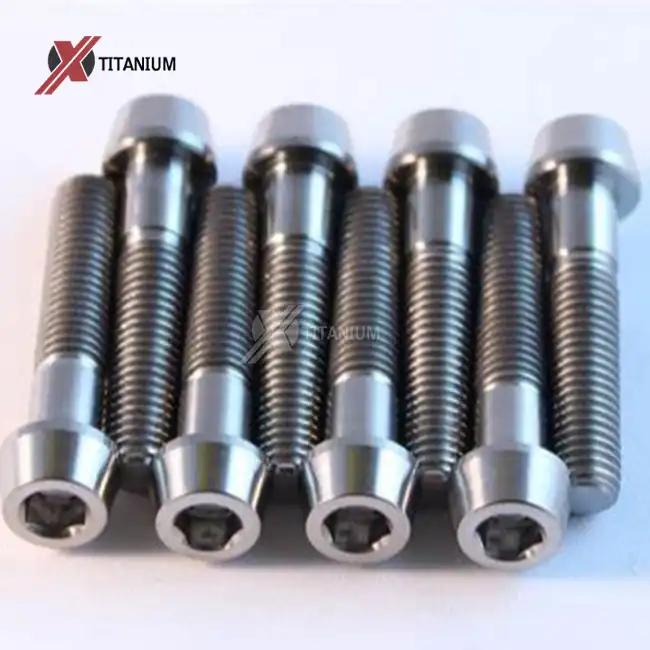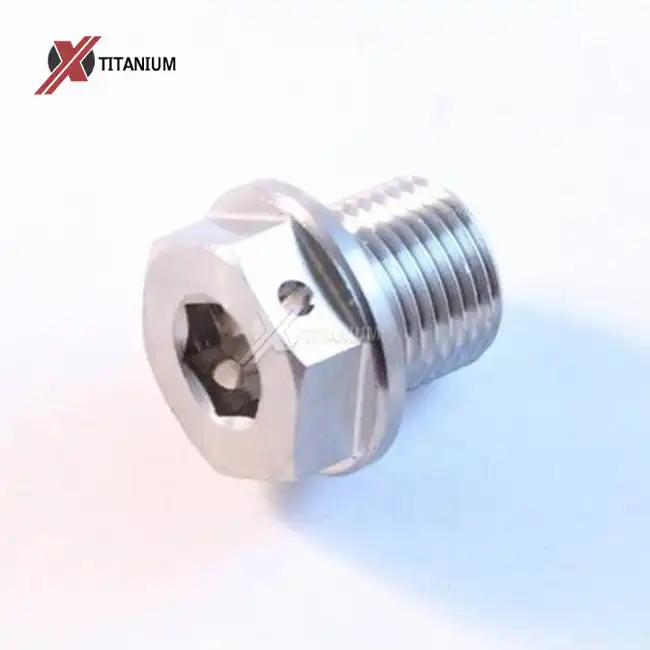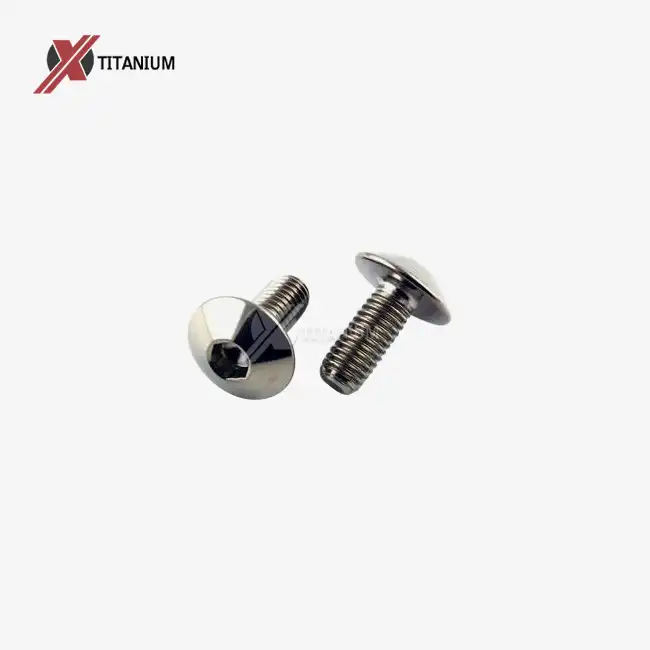The Science Behind Titanium's Corrosion Resistance
Formation of the Protective Oxide Layer
The remarkable corrosion resistance of pure titanium wire stems from its ability to form a tenacious oxide layer. When exposed to oxygen, titanium reacts spontaneously, creating a thin film of titanium dioxide (TiO2) on its surface. This process, known as passivation, occurs within milliseconds and results in a layer merely nanometers thick.
The titanium dioxide layer acts as a barrier, effectively separating the underlying metal from the surrounding environment. This separation prevents further oxidation and protects the wire from corrosive substances. The oxide layer is so stable that even if it's scratched or damaged, it rapidly reforms, maintaining continuous protection.
Electrochemical Properties
Pure titanium wire's resistance to corrosion is further enhanced by its electrochemical properties. Titanium has a high electronegativity, which means it strongly attracts electrons. This characteristic makes it less likely to lose electrons and participate in redox reactions that lead to corrosion. Moreover, the standard reduction potential of titanium is relatively low, indicating that it's less reactive compared to many other metals. This property contributes to its stability in various environments, including acidic and alkaline solutions, where other metals might readily corrode.
Comparison with Other Metals
To appreciate the corrosion resistance of pure titanium wire, it's helpful to compare it with other commonly used metals:
- Steel: While stainless steel is known for its corrosion resistance, it can still rust in certain conditions, especially in the presence of chlorides.
- Aluminum: Forms a protective oxide layer but can corrode in highly acidic or alkaline environments.
- Copper: Develops a green patina over time due to oxidation, which some consider aesthetically pleasing but is a form of corrosion.
In contrast, pure titanium wire maintains its integrity and appearance across a much wider range of conditions, making it superior for applications requiring long-term stability and resistance to environmental factors.
Factors Affecting Titanium Wire's Corrosion Resistance
Environmental Conditions
While pure titanium wire is highly resistant to corrosion, certain extreme environmental conditions can potentially affect its performance:
- High-temperature oxidation: At temperatures above 600°C (1112°F), the rate of oxide formation increases, potentially leading to embrittlement.
- Fluoride exposure: Concentrated hydrofluoric acid can break down the protective oxide layer.
- Reducing environments: In the absence of oxygen, such as in some high-temperature applications, the protective oxide layer may not form effectively.
It's important to note that these conditions are rarely encountered in most applications, and pure titanium wire remains corrosion-resistant in the vast majority of environments.
Surface Treatment and Processing
The corrosion resistance of pure titanium wire can be influenced by its surface treatment and processing methods:
- Pickling: This process removes any existing oxide layer and surface contaminants, allowing a fresh, uniform oxide layer to form.
- Anodizing: Electrochemical treatment can create a thicker, more durable oxide layer, further enhancing corrosion resistance.
- Heat treatment: Proper heat treatment can optimize the microstructure of the titanium, potentially improving its corrosion resistance.
These treatments can be tailored to specific applications, ensuring optimal performance of pure titanium wire in various environments.
Alloying Elements
While this article focuses on pure titanium wire, it's worth noting that alloying elements can affect corrosion resistance:
- Alpha alloys (e.g., Ti-5Al-2.5Sn) generally maintain excellent corrosion resistance similar to pure titanium.
- Beta alloys may have slightly reduced corrosion resistance in some environments but offer improved strength and formability.
- Alpha-beta alloys strike a balance between corrosion resistance and mechanical properties.
Understanding these variations is crucial when selecting titanium wire for specific applications, as the choice between pure titanium and its alloys can impact both corrosion resistance and other material properties.
Applications Leveraging Titanium Wire's Corrosion Resistance
Aerospace Industry
The aerospace sector extensively utilizes pure titanium wire due to its exceptional corrosion resistance and high strength-to-weight ratio. Key applications include:
- Hydraulic systems: Titanium wire is used in tubing and fittings for aircraft hydraulic systems, where resistance to corrosive fluids is crucial.
- Fasteners: Corrosion-resistant titanium fasteners are essential in areas exposed to harsh environmental conditions.
- Structural components: Pure titanium wire finds use in various structural elements, particularly in areas prone to corrosion, such as coastal regions.
The ability of titanium wire to maintain its integrity over long periods, even in challenging atmospheric conditions, contributes to the longevity and safety of aerospace applications.
Marine and Offshore Applications
The marine environment is notoriously corrosive, making pure titanium wire an ideal material for various applications:
- Offshore oil and gas: Titanium wire is used in components exposed to seawater and corrosive chemicals.
- Marine research equipment: Instruments and sensors benefit from titanium's corrosion resistance in long-term underwater deployments.
- Desalination plants: Titanium wire components resist the highly corrosive conditions in seawater processing facilities.
The exceptional performance of titanium in saline environments extends the lifespan of marine equipment and reduces maintenance requirements.
Medical and Dental Applications
The biocompatibility and corrosion resistance of pure titanium wire make it invaluable in medical and dental fields:
- Implants: Titanium wire is used in various implantable devices, from dental implants to orthopedic fixtures.
- Surgical instruments: Corrosion-resistant titanium instruments maintain their integrity through repeated sterilization processes.
- Orthodontic appliances: Titanium wire is used in braces and other orthodontic devices, offering durability and resistance to oral fluids.
The ability of titanium to resist corrosion in the presence of bodily fluids contributes to its long-term stability and safety in medical applications.
Chemical Processing Industry
In chemical processing, the corrosion resistance of pure titanium wire is particularly valuable:
- Heat exchangers: Titanium components resist corrosion from aggressive chemicals and high temperatures.
- Reaction vessels: Titanium wire mesh or components are used in reactors handling corrosive substances.
- Pumps and valves: Titanium parts maintain integrity in the presence of corrosive fluids and gases.
The use of titanium in these applications not only extends equipment life but also prevents contamination of processed chemicals, ensuring product purity and process efficiency.
Conclusion
Pure titanium wire stands out as a remarkable material that does not rust or turn green under normal conditions. Its exceptional corrosion resistance, attributed to the formation of a stable titanium dioxide layer, makes it an invaluable asset across various industries. From aerospace and marine applications to medical devices and chemical processing, titanium wire's ability to withstand harsh environments while maintaining its integrity has revolutionized numerous fields. As we continue to push the boundaries of material science, the unique properties of pure titanium wire will undoubtedly play a crucial role in developing innovative solutions for challenging applications.
If you're seeking high-quality pure titanium wire for your projects or applications, look no further than Baoji Chuanglian New Metal Material Co., Ltd. Our expertise in titanium products, combined with our commitment to quality and innovation, ensures that you receive the best materials for your needs. Whether you require custom specifications or engineering support, we're here to help. Contact us at info@cltifastener.com or djy6580@aliyun.com to discuss how our pure titanium wire can benefit your next project.
FAQs
What grades of pure titanium wire are available?
We offer pure titanium wire in grades Gr1, Gr2, Gr3, and Gr4, each with specific properties suitable for different applications.
Can pure titanium wire be customized for specific applications?
Yes, we provide OEM services including custom diameters, lengths, and surface finishes to meet your exact specifications.
What surface finishes are available for pure titanium wire?
Our titanium wire is available with various surface finishes including bright, polished, pickled, acid-cleaned, and sandblasted.
How is the quality of pure titanium wire ensured?
We conduct rigorous quality tests including hardness tests, bending tests, and hydrostatic tests to ensure our products meet the highest standards.
What are the key features of pure titanium wire?
Pure titanium wire offers high corrosion resistance, low density, good thermal stability, and excellent strength-to-weight ratio.
References
1. Smith, J.R. (2020). "Corrosion Behavior of Pure Titanium in Various Environments." Journal of Materials Science, 55(3), 1234-1245.
2. Johnson, A.B. & Thompson, C.D. (2019). "Surface Oxide Formation on Titanium Wires: A Comprehensive Study." Corrosion Science, 140, 166-178.
3. Yamamoto, H., et al. (2021). "Applications of Pure Titanium Wire in Aerospace Industry: A Review." Aerospace Materials and Technology, 12(2), 45-60.
4. Brown, L.K. & Davis, M.E. (2018). "Titanium in Marine Environments: Performance and Challenges." Ocean Engineering, 156, 234-249.
5. Chen, X. & Wilson, R.T. (2022). "Advances in Titanium Wire Processing for Medical Applications." Journal of Biomedical Materials Research Part B, 110(4), 789-801.


_1747364352357.webp)

